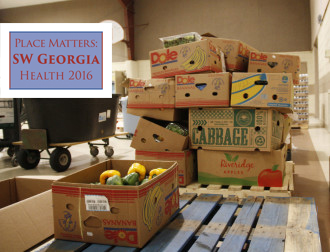This is the second in a series of articles about health care in Southwest Georgia, an area of the state that has great health needs and challenges, but also some innovative approaches to such problems. The series is the product of a collaboration between Georgia Health News and the health and medical journalism graduate program at UGA Grady College of Journalism and Mass Communication, a partnership made possible by the Ford Foundation and Grady College.
A shrill beeping, made by a panel truck being put in reverse, signals Gary Martin’s arrival at Lakeside Assembly Church of God in Moultrie. After an hourlong drive from Valdosta, he maneuvers the truck up to the rear door of the church’s gymnasium.
[youtube]https://www.youtube.com/watch?v=dchZjWzGjWY[/youtube]Once the vehicle is in place, Martin wrestles pallet after pallet of its contents into the gym. Each is heavy with food donated by retail grocers and other suppliers across Southwest Georgia, and it has reached Moultrie through a mobile food pantry network serving rural people in need.
It’s late on Thursday afternoon, and Lakeside church members will soon sort the food into plastic bags so families in need can pick it up the next day. The Saturday events are known locally as “manna drops,” after the biblical accounts of nourishment known as manna falling from heaven.
“I needed [the manna drop] before I’d ever heard about it,” says Jean Merritt, who is 54 and lives with her husband, son, and the son’s friend in the small community of Hartsfield, northwest of Moultrie.

Merritt is the full-time caregiver for her husband, who is disabled by severe heart and lung disease. She’d like to have a job outside the home, but given her husband’s condition, that’s not feasible. The family relies on his monthly disability check and on what used to be called food stamps.
Thanks to the manna drops, Merritt can keep food on the table all month long instead of running short.
Her situation is not unusual. An estimated 26 percent of Southwest Georgia people live with uncertainty about where their next meal will come from.
‘People who really need help’
According to Feeding America, food insecurity is worse in mainly rural Southwest Georgia than in most other parts of the state.
That reality goes against the rosy stereotype of farm country as a “breadbasket,” but food availability is not a simple matter. Many residents of Southwest Georgia are poor, and spread out across thousands of square miles of small towns, farmland, forests and empty fields.
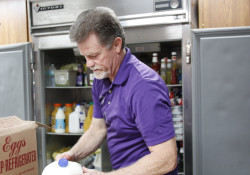
Addressing this kind of food insecurity “is vastly different than dealing with hunger in an urban setting,” said Eliza McCall, chief marketing officer for Second Harvest of South Georgia.
Second Harvest works with more than 400 partner agencies – local food pantries, churches, and other organizations – to coordinate and distribute food for the manna drops across 30 counties in southwest Georgia. By trucking food closer to people who need it, the drops help overcome the lack of transportation that causes many families to go to bed hungry.
Basic travel is a problem for poor people in an area like Southwest Georgia. There is little if any public transit, and those who cannot afford a vehicle face difficult choices.
Older adults and young children are especially hard hit. “You’re looking at groups who are not likely to be able to walk two miles, or in a rural area like this sometimes five miles, 10 miles to get to their closest source of food,” said McCall.
Jean Merritt is lucky in this regard. She has a car, but she still has to drive 13 miles into Moultrie to reach the nearest grocery store.
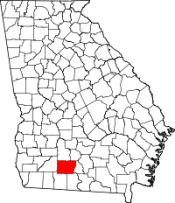
Forty percent of Colquitt County’s children live in poverty, which far exceeds the 26 percent figure statewide, according to County Health Rankings. More than 8 percent of adults are unemployed, higher than the national and state averages, and 28 percent are uninsured.
Lakeside Assembly is located near some of Moultrie’s lowest-income communities. “We just saw a great need. It’s a pretty depressed area economically,” said Pastor Donnie Lewis. So the church partnered with the Healthy Colquitt Coalition to fund their manna drop 13 months ago. Now a delivery arrives at the church gym on the last Friday of every month.
A chance at a full table
Lewis is waiting at the gym when Gary Martin backs the truck up to the door. As soon as one pallet hits the floor he uses a pocket knife to cut away the shrink-wrap cocooning the boxes of food. Lewis packs the sticky plastic into a ball and lofts it toward the trashcan before zipping on to the next pallet.
What’s on the pallets depends on what items retail grocers need to move off shelves before they expire. Produce, breads, and baked goods are mainstays. Some boxes are surprises. One recent drop featured a whole pallet of cranberry sauce; this last, a pallet of cranberry juice concentrate.
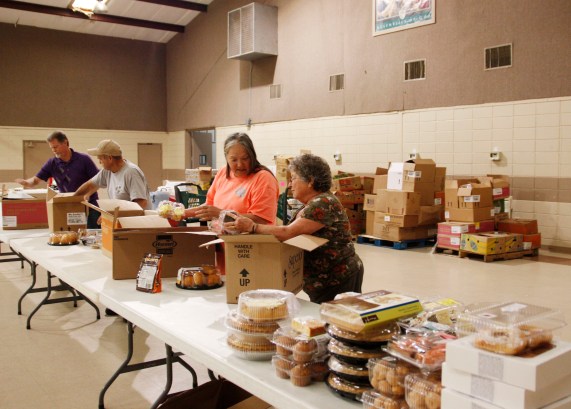
The third one Lewis unwraps is stacked with Greek yogurt and various types of fresh milk. (There were no dairy products the month before.) The fourth reveals boxes of greens, blueberries, apples and cheese. The last pallets are piled mostly with bread and sweet baked goods. In all, there is enough food to feed around 70 families.
Merritt says the manna drops have helped her tremendously. The $78 per month the family receives in supplemental nutrition assistance (SNAP) benefits doesn’t always cover the food they need. Without the drop, said Merritt, “It wouldn’t be full meals. That’s for sure.”
She’s very grateful for the shipments, but admits that sometimes she wishes for things that just aren’t available.
“Tonight, I would have loved to have had a salad to go with the spaghetti that we had, you know.”
Members of Lakeside’s congregation understand what it’s like to go without. Many of the volunteers who sort through the pallets Friday are financially eligible to take the same food home on Saturday, says Belinda Moody, a parishioner and manna drop organizer.
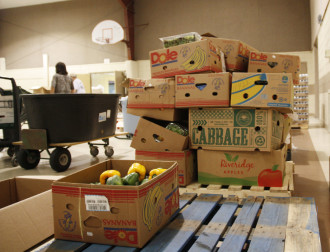
So far, Moody estimates the church has given food to around 700 families in a little over a year. “We’re helping people who really need help,” said Moody.
Many of these people, Moody said, have jobs but don’t earn enough to feed their families for the whole month. Poverty is a pervasive reality for the residents of Colquitt County and Southwest Georgia, and people who can’t afford adequate nutrition are drained of energy and sometimes ambition.
That’s why Lewis believes the manna drop at the church does more than silence a grumbling belly. “It’s really a matter of getting into people’s lives, investing in those people, and in many cases seeing the change in those people.”
Merritt says her life has been touched by the Lakeside volunteers. “The ministry they do while you’re there is outstanding.” Volunteers converse with everyone who comes through the door, and they offer to pray with them.
One woman among the volunteers, Merritt says, always offers a smile and a big hug to the locals.
Merritt doesn’t know the woman’s name. But she does know how this visitor’s simple gesture can lift her spirits when she’s having a dark day. “And sometimes all a person needs is a hug.”
Lauren Baggett is a health and medical journalism graduate student at UGA’s Grady College of Journalism and Mass Communication, where she also received her bachelor’s degree in magazine journalism in 2009. For five years she managed the sales and marketing team for a local Athens company, but her growing interest in health, food, and mental wellness motivated her to return to journalism. She hopes to write about the intersections of health and culture in the future.

